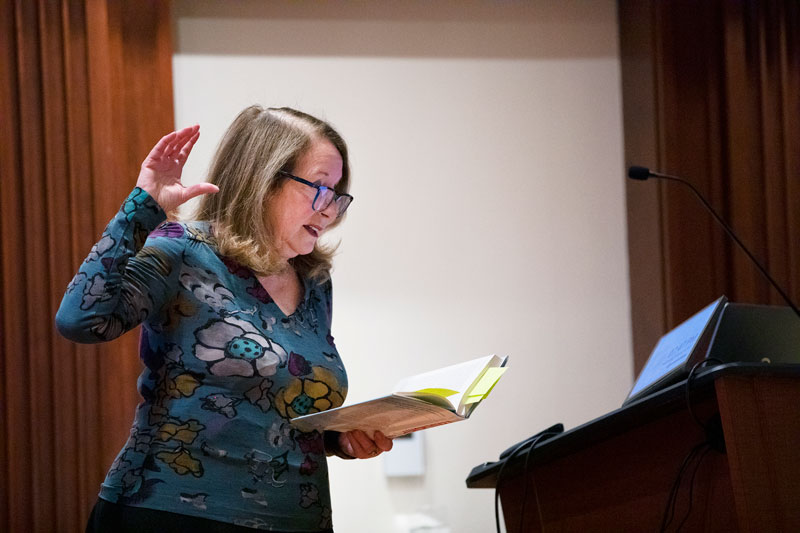
Above: Kellerman addresses leadership and followership in her series of lectures on campus.
Read time:
The power balance in leadership is changing, according to visiting scholar and world-renowned leadership expert, Dr. Barbara Kellerman. Followers, she believes, are becoming as powerful – perhaps even more powerful – than leaders.
“Because of this growing, global trend we’re experiencing right now, leadership approaches that worked 10 or even five years ago won’t work today,” said Kellerman. “It’s old-fashioned to think in leader-centric terms. It’s dated.”
Kellerman, a distinguished thought-leader, author and speaker, is visiting leadership scholar for the spring 2022 term. Over the semester, students have had the opportunity to meet with her in small groups for conversations and mentoring, and to attend her series of lectures on leadership and followership. She recently addressed students from the President’s Leadership Program as well as faculty and community members. She urged students to study followership with the same passion they would apply to leadership – words that resonated with freshman Christina Richardson ‘24.
“I wholeheartedly agree that followership is just as important as leadership,” Richardson said. “Too often leadership is over-emphasized, especially in our country, where we know leaders are often more successful than their followers. But we also need to understand how to be a quality follower ourselves, since everyone is a follower to someone.”
Kellerman pointed out that this shift in power to followers isn’t new. Historically speaking, she said, it tends to occur during tumultuous political eras or periods of conflict.
“It’s something we see in times of change or uprising, such as colonialism, apartheid, the fight for women’s rights, civil rights and LGBTQ rights. Really, it’s what resistance movements are all about – followers stop following. Or, at least, they’re no longer willing to follow in the same way. That’s why I tell my students followership is critically important to study, even if many don’t want to. At Harvard, I created a course around followership and assumed everyone would be intellectually interested,” Kellerman recalled. “Guess what? Students didn’t come. They figured, ‘I came to Harvard to be a leader, not to learn how to be a follower.’ They didn’t even want to learn about followership.”
But understanding followership will give leaders insight, Kellerman argues, to navigate this current trend where both leadership and expertise are less valued. “We’re in a period where people don’t care much about credentials. I often tell the story of what happens when I walk into a classroom these days. I used to be called Professor Kellerman. Or Dr. Kellerman. Now my students call me Barbara. This is a perfect example of how followers now bring me down and elevate themselves. What they’re saying is, 'So what if you have a PhD from Yale and teach at Harvard. That doesn’t matter to us. You’re just another person, and you need to prove to us that you’re worthy of our attention.' My power as a leader has declined, and I’m just one of a billion examples.”
“Having Dr. Kellerman here to talk with students, faculty and staff highlights a need to return to a conversation of what true leadership is and how we engage others in the leadership process," said Dr. Kathleen Callahan, professor of Leadership and American Studies. "She has challenged us to rethink our own understandings, and more importantly, to be involved in the process of leadership and followership during times of crisis."
Kellerman concluded by urging students to be agile, not discouraged, by the new challenges of leading. “Even though I’ve spent the last 30 minutes telling you how leaders have diminished in power and followers are more powerful, I need to undercut my own argument and remind you that leaders, good leaders, still matter.”